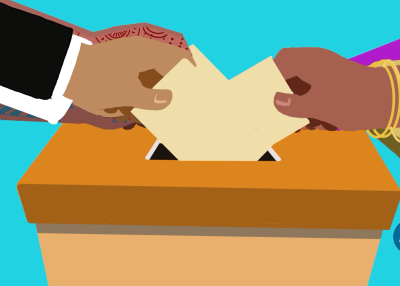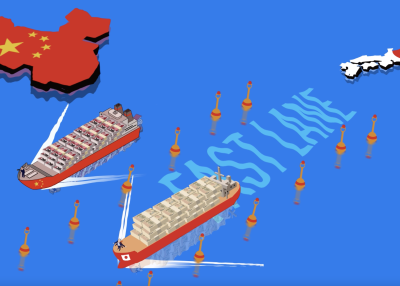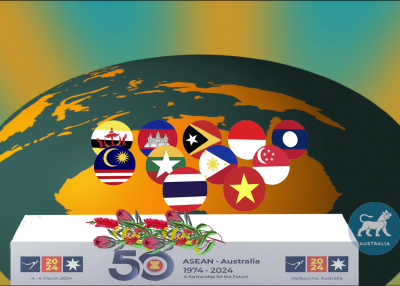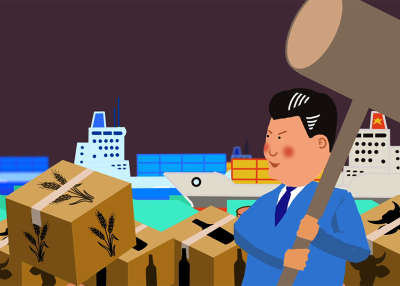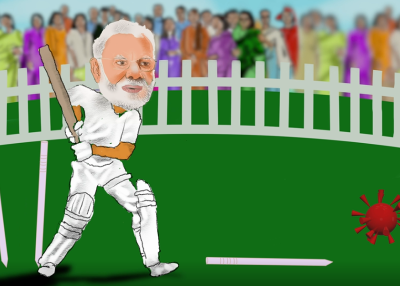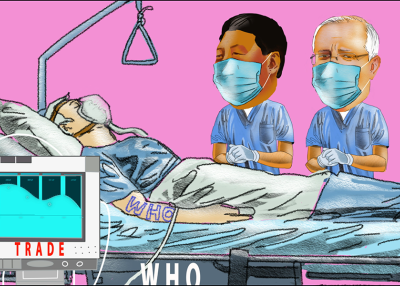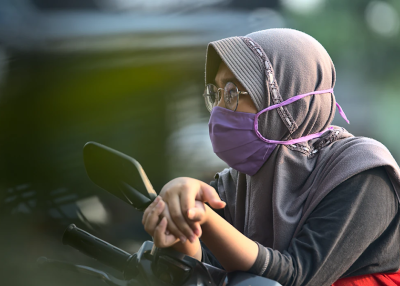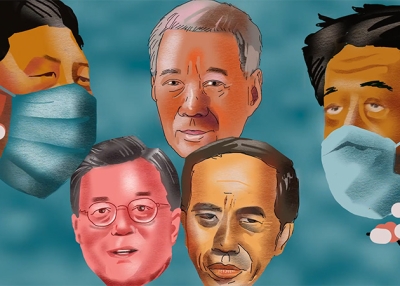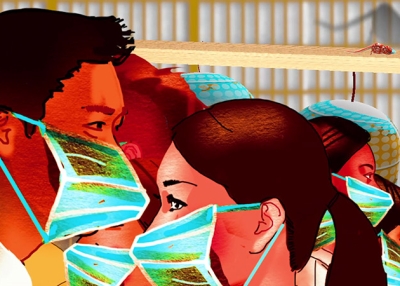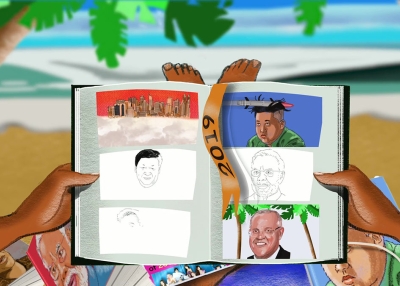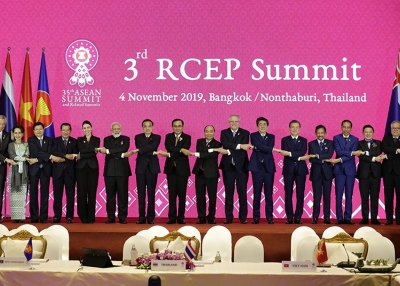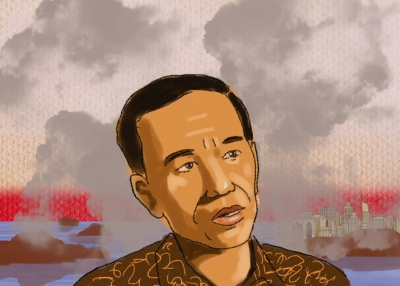Briefing MONTHLY #17 | May 2019
Election winners and losers | PNG shakeup | Chinese warriors

The new international affairs team: Foreign minister Marise Payne, trade minister Simon Birmingham, defence minister Linda Reynolds and international development minister Alex Hawke.
FESTIVAL OF DEMOCRACY
Prime Minister Scott Morrison may have once looked like an unlikely election winner. But he has turned out to be part of a clean slate of four regional incumbents who strengthened their grip on power in May. And all have left their opposition establishments in varying states of despair. The better than expected results for the incumbent leaders in India, Indonesia and the Philippines have given them the opportunity to pursue more stable long-term policies after some contradictions before the voting.
AUSTRALIA: MORE PACIFIC STEPS
In a national security ministerial team emphasising continuity over change, Prime Minister Scott Morrison’s choice of Alex Hawke as Minister for International Development and the Pacific (and assistant defence minister) has made him one of the returned government’s most interesting new players. As a close Liberal Party political ally of Morrison, he may well have as much influence with the prime minister in the near region as his more senior ministers in this space. Hawke brings relatively little past experience in this area to the new job apart from service on the Parliament’s Joint Committee on Foreign Affairs, Defence and Trade and his recent experience as the assistant minister for home affairs, immigration and border protection. But Morrison has underlined his personal focus on Australia’s near neighbours in the South West Pacific by making his first visit abroad after the election to the Solomon Islands, adding to the Pacific Step-up policy he announced last year. Significantly he sought to disentangle Australia from perceived rivalry between the US and China by saying there was “great danger” in seeing the region through that prism. With several Pacific leaders making it clear they want to be able to take development aid from China, Morrison appears to be trying to position himself as an honest broker in the neighbourhood rather than being seen as locked into US policies. But with the Pacific countries prone to blaming Australia for not paying their concerns enough attention, finessing this position will eventually fall to Hawke. However, his combination of the aid and defence roles has only underlined how the near Pacific has shifted from being seen as mainly an economic dependency issue for Australia to also being a strategic dilemma. Meanwhile the Labor opposition, which had a much more extensive suite of election policies covering Asian engagement, trade reform and the rise of geo-economics, has been left to focus more domestically on rebuilding its political base rather than burnishing its Asian legacy.
INDIA: DYNASTY UNDER PRESSURE
Incumbent Prime Minister Narendra Modi. Animation: Rocco Fazzari. View it here.
The Indian National Congress may have rejected the resignation of its fourth generation Nehru-Gandhi family leader Rahul Gandhi after another disastrous national election loss, but the question remains: is it time for a change. Gandhi’s loss of the family seat of Amethi in the stronger than expected victory for Prime Minister Narendra Modi’s Bharatiya Janata Party has only underlined how the BJP appears to have usurped the Congress as India’s natural party of government. With only 52 (up 8) national parliamentary seats compared with the BJP’s 303 (up 21) and none from 19 of the country’s 36 states and territories, Congress is in danger of being only first amongst many parties in a fractious opposition. It is estimated that the BJP won 92 per cent of contests with a Congress candidate and only 52 per cent of direct contests with other parties. The BJP has its own dynasties and Congress has a fresh Nehru-Gandhi family member in Rahul’s sister Priyanka waiting in the wings. But this election seems to be suggesting that in aspirational rising India, the Gandhi family name has lost its political potency. This piece from The Atlantic provides a good insight into the future of the Gandhi dynasty.
PHILIPPINES: REVOLVING DOOR
While India’s principal political family is under a shadow, the Philippines mid-term election was more about a traditional shuffling the spoils from one family to the next. The latest scions of the opposition Aquino and Roxas families (which have produced three former presidents between them) lost their Senate seats to the three-pronged political machine of President Rodrigo Duterte (his own party PDP-Laban, his personally backed candidates and his daughter Sara’s own parallel Faction for Change team). In the race for 12 Senate seats up for grabs which provide the best national vote proxy for the 2022 presidential election, Duterte-aligned candidates won nine seats, the opposition none and notionally independent candidates three. Sara Duterte now seems positioned to be a future presidential candidate alongside Cynthia Villar, whose husband is both the country’s richest person and a former politician. And the daughter of former dictator Ferdinand Marcos early won a Senate seat and becomes a national figure alongside her brother. Meanwhile the family of former President Joseph Estrada went backwards losing bids for Senate seats and their hold on city government including Manila. This Nikkei Asia Review article by Richard Heydarian examines the most substantial outcome from the election: Duterte’s push for a new federal structure.
INDONESIA: OVERHAUL NEEDED
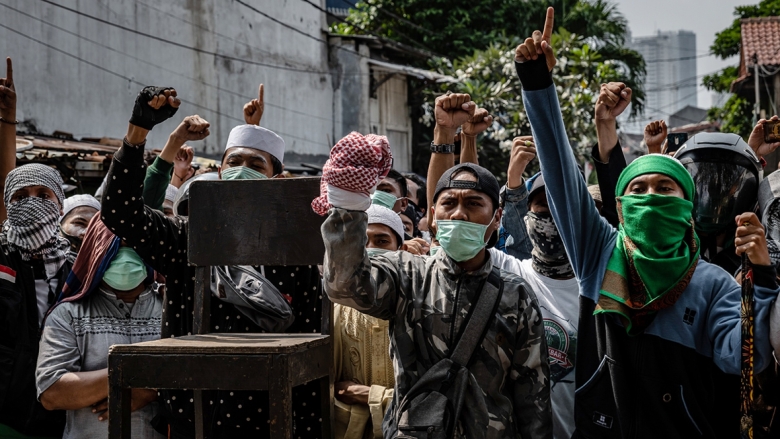
Protesters shout during a demonstration in Jakarta after official election results were announced. Photo: Ulet Ifansasti/Getty Images
The divisions within the coalition behind failed presidential contender Prabowo Subianto have been overshadowed by the street violence which followed the hamfisted release of the official election results in the middle of the night on May 21. Nevertheless, former president Susilo Bambang Yudhoyono’s Democratic Party has quickly accepted President Joko Widodo’s victory, with Yudhoyono’s son Agus even lining up for a picture with Widodo. The other key alliance supporter of Prabowo’s Gerindra Party – the modernist Muslim National Mandate Party – has been giving mixed signals after initially accepting the election results. While Widodo has won a stronger electoral mandate than in 2014, it has been at the expense of a country more divided on religious lines. The deaths of about 400 election officials due to overwork and the more polarised outcome is prompting debate about how to relieve these pressure points. Melbourne University’s Dave McRae says the challenge to Widodo’s win is unlikely to succeed but moving away from a two-person contest in future might ease tensions.
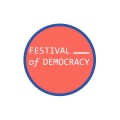
ASIA BRIEFING UNWIRED
Don’t miss Asia Society Australia's special podcast series on the elections in India and Indonesia.
Episode One we talk to two emerging young players in Indian politics, Charu Pragya and Manuraj Shunmugasundaram.
Episode Two we join the campaign closer to home with the Indonesian expatriates running their country’s election in Australia and the Indian Bharatiya Janata Party’s local campaign chief Jay Shah.
Episode Three we caught up with dual-country expert Ward Berenschot and international relations theorist Parag Khanna about the big picture view of democracy in the two voting nations.
Listen on Soundcloud and Spotify.
NEIGHBORHOOD WATCH
PNG’S PM GONE FOR NOW
Papua New Guinea’s now former Prime Minister Peter O’Neill left office the way he came in: trying to divide his fractious enemies while skilfully using the country’s legal system to extend his time in office. Given his predecessors have not gone away easily, he can’t be written off entirely. But he is now in the precarious position of relying on his successor and occasional ally James Marape to provide him with some protection against legal action when the Ombudsman’s report into the Oil Search loans controversy is released. This (paywalled) Australian Financial Review investigation provides the best insight into the complex origins of the financial transaction which has ultimately brought O’Neill unstuck.
WAR OF REPORTS
Singapore’s Shangri-La Dialogue is well attended for the opportunity to watch some form of showdown between the US and China and the latest gathering was no different. But what was interesting beyond the war of words was the choice of materiel deployed by each side at the event. The US released its first Indo-Pacific Strategy Report which says China is trying to “reorder the region to its advantage by leveraging military modernization, influence operations, and predatory economics to coerce other nations.” Meanwhile China opted for a more economic focus by releasing its white paper on US trade relations which says: “China does not want a trade war, but it is not afraid of one and it will fight one if necessary. China’s position on this has never changed.” What was somewhat lost in this set piece standoff was the new focus at this year’s Dialogue on regional infrastructure and especially China’s Belt and Road Initiative (BRI) in regional security. This Straits Times piece from International Institute for Strategic Studies associate fellow Lynn Kuok explains how South East Asian nations are cautiously proceeding with BRI projects while Australia equivocates. She says: “Though many projects have not materialised, the BRI has reinforced the economic momentum in China's favour that is shifting the sands in the region's strategic landscape.”
THIRTY YEARS ON
Tiananmen Square: erasing bodies and memories. Animation: Rocco Fazarri. View it here.
The 30th anniversary of the Tiananmen massacre in Beijing has only served to highlight one of the starkest divisions over history in modern Asia: increasingly frustrated debate about the event in the west alongside mounting evidence of little preparedness to acknowledge the event in China. Given that even democratic Indonesia is unable to deal with its 1965 parallel massacre, this looks like being a cultural divide for a long time. Perry Link on Chinafile argues here that the Chinese people want the west to keep the memory alive. Meanwhile the arrival of Chinese warships in Sydney Harbour on the anniversary of the massacre sparked a debate.
ASIAN NATION
STEEL YOURSELF
Economist Ross Garnaut says Australia could reverse the long decline of its metals manufacturing industries and become the most competitive place in the world to smelt aluminium and make steel. In the latest of a series of lectures at the University of Melbourne about how to deal with climate change, he says: “In a zero carbon world economy, there would be no economic sense in any aluminium or iron smelting in Japan or Korea, not much in Indonesia, and enough to cover only a modest part of domestic demand in China and India.” Australia would instead have the opportunity to step in to become the world’s main source of imports for steel and aluminium as a result, instead of just exporting the raw ores. Processing iron ore and bauxite onshore would add twice as much value and double the number of jobs that Australia currently generates through its coal and oil sectors, he argued.
RETHINKING THE RETHINKING
Australia China Research Institute acting director James Laurenceson has a reputation for applying forensic research to some of the more colourful assertions of Chinese interference in Australia. Now in the latest contribution to the bounded engagement debate about China, he has taken the same approach to the idea that Australia needs to reduce its economic dependence on China. Without rejecting the value of diversification per se, he argues in a new report that the risks associated with China are predictable (or grey rhinos in the language of risk analysis) rather than unpredictable black swans.
Read Bates Gill’s essay on “bounded engagement” for Asia Society Australia’s Disruptive Asia 2019 Special China Edition.
DEALS AND DOLLARS
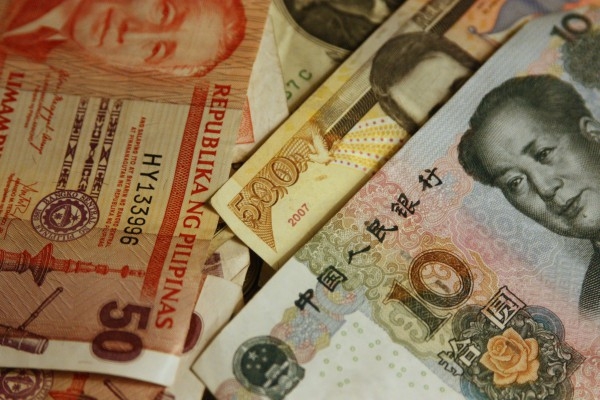
TOGETHER AGAIN
It will be a bit like the old gang getting back together again. Fresh from seeing out the federal election from New York, former Prime Minister Malcolm Turnbull seems set to return to his old self as an advocate of business ties with China. Turnbull will be a keynote speaker at the Australia-China Economic Trade and Investment Expo in Melbourne on July 12 after facing some tense times with China as Prime Minister over both trade and security issues. Turnbull will be joined by a bipartisan turnout of supporters of the China relationship including former trade ministers Andrew Robb and Craig Emerson, former foreign minister Bob Carr and current Victorian Premier Daniel Andrews.
THAI ROAD
Australia’s biggest automotive parts supplier Bapcor continues to be happy with is expansion into Thailand under its Burson brand. Chief executive Darryl Abotomey told The Australian Financial Review May 20 that the first two Thai stores were running at break even or better in a year. “Given they have got there so quickly, there is a very good chance there will be some more,” he said. Two other stores are under way, including one in a shopping complex run by Central Group which wants to have more.
DIGITAL DELAYS
Technology entrepreneur Patrick Grove flies under the radar in the debate about Australia’s relative success doing business in Asia. Singapore-born and Malaysia-based, Grove, 44, nonetheless qualifies as Australian on the annual Financial Review Rich List at 105th with wealth of $885 million. But the past year has been difficult for the man dubbed “Australia’s most successful entrepreneur in South East Asia.” His plans for a technology start-up hub in KL’s planned Internet City have been delayed under the new government; his earlier floats iCar Asia and Frontier Digital Ventures languish near their listing prices; and plans for floating his regional streaming service iflix appear to be moving slowly.
PICTURE PERFECT
Former Blackmores Chief Executive Christine Holgate has attributed a ten-fold increase in the company’s sales to China four years ago substantially to a lucky photograph of her and President Xi Jinping during the 2014 Group of 20 nations summit in Brisbane. Speaking at Australia Post's Crossborder Ecommerce Expo, the now Australia Post Chief Executive, revealed how she had managed to take her mobile phone into the business leaders reception with the national leaders after being told by Blackmores staff that a picture with Xi would be a sales booster. “The following week I was going to China with my board and we go to see Shanghai Pharmaceutical and we are walking in and this photograph is the whole size of the whole wall and my team in China has sent it to everyone … that year we finished in China at $50 million, the following year we finished in China at $500 million,” she was reported as saying.
DIPLOMATICALLY SPEAKING
“I would say that Japan has had a substantial edge for many, many years, but that’s okay. Maybe that’s why you like us so much. But we’ll get it a little bit more fair, I think. I think we’ll do that.” US President Donald Trump speaking before a meeting with Japan’s Prime Minister Shinzo Abe.
DATAWATCH
TRADE WARS CHARTED
US tariffs may soon be higher than India’s …
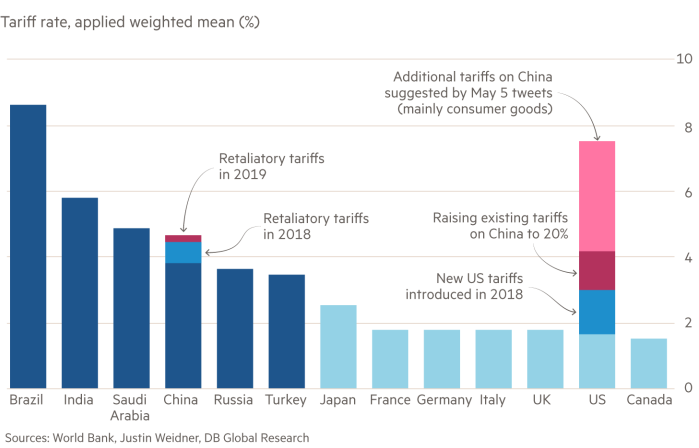
Source: Financial Times
… But other countries are large enough to work against a trade war
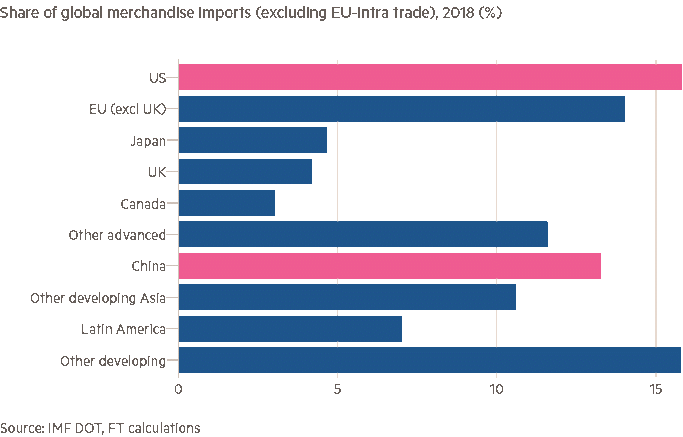
Source: Financial Times
Despite efforts to diversify, Australia’s China dependence is rising.

Source: ABS/ACRI
GALLERY
RETURN OF THE WARRIORS
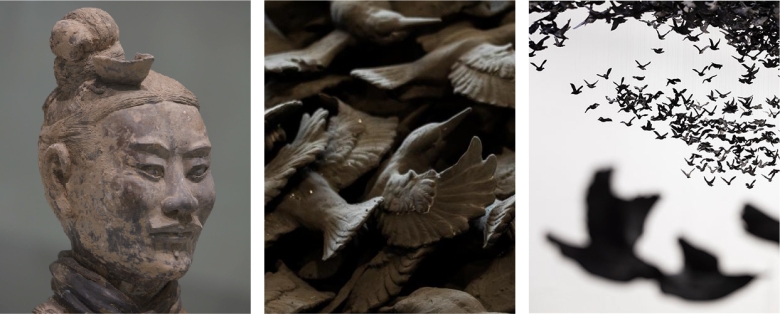
NGV Melbourne Winter Masterpieces now exhibiting "Terracotta Warriors: Guardians of Immortality" and "Cai Guo-Qiang: The Transient Landscape". Photos: Sean Fennessy/NGV
In 1982 the National Gallery of Victoria presented its first exhibition of the Chinese terracotta warriors, not long after the discovery of one of the greatest archeological finds last century. Some are now back in a broader presentation of old and new Chinese art in the NGV’s Melbourne Winter Masterpieces. The exhibition features eight warrior figures and two life-size horses from the Imperial Army, as well as two half-size replica bronze chariots, each drawn by four horses. The terracotta warriors are contextualised with a presentation of more than 160 ancient treasures of Chinese historic art and design, from leading museums and archaeological sites from across Shaanxi province where the warriors were found.
WHAT WE'RE READING
THAILAND: HISTORY, POLITICS AND THE RULE OF LAW by JAMES WISE (Marshall Cavendish)
James Wise makes it quite clear from the beginning of this book that he sees himself bringing the practical skills of a government bureaucratic adviser to the task of deciphering Thailand, rather than the perspective of perhaps a democracy theorist, a human rights activist or even a journalist just looking for a colourful story. That makes this book a detailed explainer of what Thai democracy activists forlornly call dhamma-cracy – the mix of traditional social hierarchy and modern rule of law that still prevails in Thailand. Wise was Australia’s ambassador to Thailand during the early years of the showdown between the upstart election winning businessman Thaksin Shinawatra and the Bangkok military-based elite that has finally reached an uneasy settlement with the recent election. He seeks to explain why Thailand has been quite a strong economic performer despite its reputation over more than half a century for being coup prone and how it has a unique Asian experience of combining modernity and tradition due to never having been formally colonised by a western power. “Western ideas influenced Thai political culture, but they never crushed established ways of thinking … It is this hybrid nature of political authority in Thailand that makes its politics distinctive, even idiosyncratic, and harder to understand,” he writes. The simplest illustration of this is the way the military and monarchy continue to exercise as much power and legitimacy as the three arms of power in a conventional democracy – the executive, legislature and judiciary. Wise skirts around the most interesting of these at the moment – the apparently even more active role of new King Vajiralongkorn than his revered father. But his conclusion isn’t great news for Australia trying to build strong ties in South East Asia or the region itself which looked to Thailand for leadership under Thaksin: the 2014 coup won’t be the last and the 2017 Constitution won’t be the last.
ON THE HORIZON
SUMMIT SEASON BEGINS
Prime Minister Scott Morrison nominated Japan’s Prime Minister Shinzo Abe as the foreign leader he would most likely turn to for advice in one of his few comments on foreign policy during the election campaign. This month he will see whether Abe returns the compliment when he travels to Japan for the Group of 20 major economic powers summit on June 28-29. Before then the G20 finance ministers and central bankers will meet in Japan on June 8-9.
ABOUT BRIEFING MONTHLY
Briefing MONTHLY is a public update with news and original analysis on Asia and Australia-Asia relations. As Australia debates its future in Asia, and the Australian media footprint in Asia continues to shrink, it is an opportune time to offer Australians at the forefront of Australia’s engagement with Asia a professionally edited, succinct and authoritative curation of the most relevant content on Asia and Australia-Asia relations. Focused on business, geopolitics, education and culture, Briefing MONTHLY is distinctly Australian and internationalist, highlighting trends, deals, visits, stories and events in our region that matter.
Partner with us to help Briefing MONTHLY grow. Exclusive partnership opportunities are available. For more information please contact [email protected]
Read previous issues and subscribe >>

